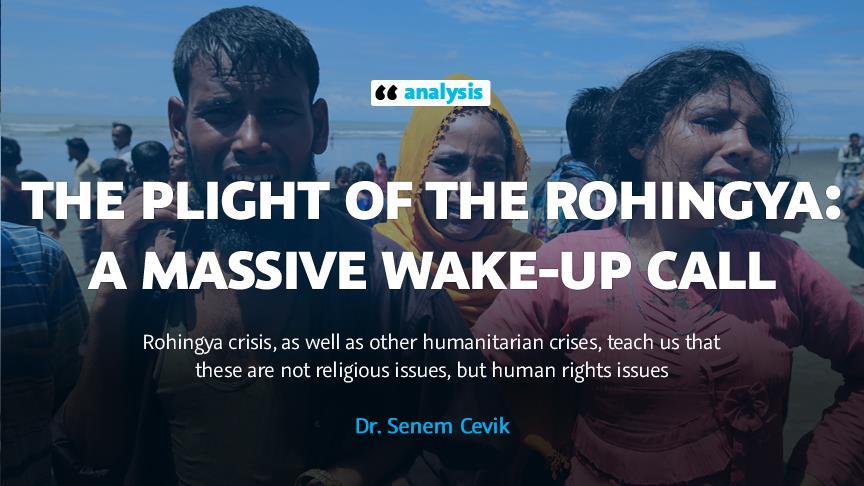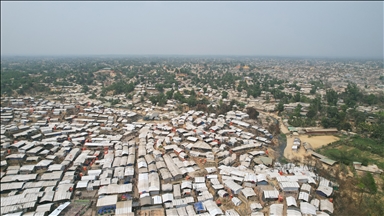The plight of the Rohingya: A massive wake-up call
Rohingya crisis, as well as other humanitarian crises, teach us that these are not religious issues, but human rights issues

By Dr. Senem Cevik

CALIFORNIA
Myanmar is stirring with a wave of violence under the governance of Aung San Suu Kyi who won the country’s first democratic elections in 2016.
The de facto leader of Myanmar and Nobel Peace Prize laureate, who was confined to 15 years of house arrest for her fight for democracy, is now being accused of covering up the crimes of the Myanmar military perpetrated in the western Rakhine state.
Despite the initial hope in her leadership, little has changed in Myanmar where the Rohingya minority is still denied citizenship and is persecuted on a daily basis.
The situation is so dire that even the UN describes Rohingya as the most persecuted and friendless ethnic minority in the world.
Although the Rohingyas have faced institutional discrimination since the 1970s and violence
Before the 2015 elections, they were stripped of the right to vote and this electoral disenfranchisement in the area rubbed salt into the Rohingya Muslims’ wounds while punitive new laws even targeted their right to have children.
Since the height of the latest crisis on August 25th, more than 370,000 Rohingya, who are a Muslim minority, fled to neighboring Bangladesh.
Tens of thousands of Rohingya have been in refugee camps in Bangladesh since last October with thousands rushing towards the border every day, resulting in the exhaustion of Bangladeshi resources.
Silence of international community deafening
Amidst the ongoing violence in Myanmar directed towards the Rohingya minority, the international community is remaining silent.
The conflict in Myanmar has put the functionality of international institutions under the spotlight. Although UN Secretary General Antonio Guterres expressed his concerns and UN Human Rights Chief Zeid Raad al-Hussein described the violence as a textbook example of ethnic cleansing, there has so far been no action taken.
The UN, time and again has proven to be incapable of solving conflicts while the international community has failed to give a firm response.
Five permanent members of the UN Security Council have been somewhat indifferent to the Rohingya humanitarian crisis. While China and Russia have backed the Myanmar government, crashing local protests in their countries, the French authorities expressed concern over the issue.
The British authorities have warned Myanmar, but dissatisfied MP’s are urging the government to suspend British training of the Burmese military.
While the U.S. under the Obama administration lifted sanctions against Myanmar in 2016 citing the progress the country has made, a recent White House statement urged Myanmar's troops to respect the rule of law, stop the violence, and end the displacement of civilians from all communities.
On the other hand, thousands of Muslims across the world are protesting the Myanmar government, while their own governments are either remaining silent on the issue or have a bad track record of human rights in their own countries.
Standing with Rohingya refugees
The UN Refugee Agency has an ongoing aid drive to ease the refugee crisis and the EU also has announced additional humanitarian aid to the refugees.
However, as the plight of the Rohingya worsened, many countries paid lip service in response to the crisis. There were a few initiatives led by concerned countries, including Turkey,
Despite Myanmar’s ban of UN bodies to provide aid to the Rohingya in Myanmar, Turkey’s TIKA (Turkish Cooperation and Coordination Agency) was able to secure access to the Rakhine state.
This development is significant because Myanmar has blocked the UN aid agency from delivering vital supplies to civilians.
In fact, Turkey has been actively involved in humanitarian relief for the Rohingya Muslims since 2012 through Turkish NGOs, including Kizilay (Turkish Red Crescent) and state-affiliated agencies such as TIKA and AFAD (Disaster and Emergency Management Presidency).
The first week of September, a Turkish delegation including First Lady Emine Erdogan, Foreign Minister Mevlut
However, it is not possible for Turkey to tackle this humanitarian crisis on its own or for Bangladesh to respond to the needs of refugees without global support.
The international community has shown some interest in the humanitarian crisis with the media’s growing attention to the issue. In that sense, the Rohingya’s plight has received some coverage in global news cycles.
Nonetheless, aside from issuing statements, the international community is still standing idle. More importantly, the UN with its current structure of the Security Council is incapable of delivering results in ending conflicts.
Today, many global conflicts affect their proximate regions. Millions fleeing Syria sought refuge in Jordan and Turkey, Sudanese found refuge in neighboring Uganda, Central Americans cross the border to Mexico, and the Rohingya flee to Bangladesh.
The global refugee crisis is thus on the shoulders of these nations hosting refugees as the developed countries in the West are not very eager to open their doors to refugees.
Therefore, these host countries need to collaborate to find better solutions for the repercussions of the global refugee crisis. In that regard, dialogue channels between host countries need to be open.
However, as the resources of these host countries are limited and being exhausted financial aid remains a short-term solution.
The international community should take responsibility and share the burden. Despite this dire need to coordinate efforts, gathering a realistic yet firm response from the international community and a workable solution to global conflicts such as the one in Myanmar remains a difficult task.
Two key challenges lie ahead: The first one is reforming the structure of the UN Security Council to better fit the demands of the crises in the 21st century. The second one is having a common understanding among nations when it comes to looking at conflicts from a non-religious, non-ethnic lens.
The Rohingya crisis, as well as other humanitarian crises such as the Syrian refugee crisis and the Central American refugee crisis, teach us that these are not religious issues, but human rights issues.
Without such improvements and a common approach, there will not be a firm response to these global issues facing humanity and much of the burden will remain on the shoulders of developing countries.
*Opinions expressed in this article are the author’s own and do not necessarily reflect the editorial policy of Anadolu Agency.
Anadolu Agency website contains only a portion of the news stories offered to subscribers in the AA News Broadcasting System (HAS), and in summarized form. Please contact us for subscription options.


